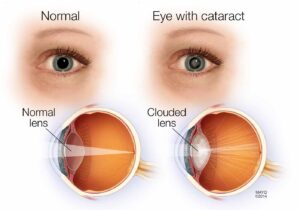Age-related eye conditions are highly prevalent. With age, vision changes as chemicals in the body change.
Some age-related eye conditions are more common than others. As you age, you’re at higher risk for glaucoma, macular degeneration, and diabetic retinopathy to name a few.
Your risk of developing cataracts is far higher than any other eye condition. Most people will eventually develop cataracts at some point in their life.
The only treatment for cataracts is cataract surgery. Since cataracts tend to affect everyone eventually, most people will need cataract surgery at some point.
To understand why, keep reading. You will learn more about what cataracts are, how they affect your vision, and when cataract surgeons recommend having cataract surgery.
What are Cataracts?

Cataracts happen when your eye’s natural, crystalline lens becomes cloudy. This cloudiness is called a cataract.
Essentially, your lens is like a window, and a cataract is like fog on the window. The foggier the window gets, the harder it is to see through. As the natural lens becomes harder to see through, this leads to visual impairments like blurry vision, glare, halos, or finding it more challenging to drive at night.
One of the most common reasons that cataracts develop is because of age. Cataracts can also occur for other reasons, like corticosteroid use, injury, trauma to the eye, or previous eye surgery. As you grow older, your risk of cataracts increases.
Cataracts develop over different amounts of time depending on the person. Some cataracts can develop very slowly.
Sometimes, when they can take a long time to develop, you may not realize you have them, especially at first. Symptoms can take some time to become apparent, meaning it could be several years before your vision seems any different or you notice any changes.
Cataract Symptoms
When your cataracts are significantly developed, you may experience several symptoms, including:

- Blurry vision
- Poor night vision
- Glare and halos
- Light sensitivity
- Muted, dull color perception
- Noticing that colors look muddier than they used to
- Double vision in only one eye
- Needing more light to complete fine-focus tasks
Since these symptoms tend to appear gradually over several years, they can be hard to spot at first. Another thing that can make cataracts challenging to identify is that their symptoms are often mistaken for declining vision due to presbyopia.
Presbyopia is the decreased ability to focus up close due to the natural lens losing flexibility. Many cataract patients also have presbyopia, as they’re both age-related conditions.
Because presbyopia and cataracts share similar symptoms, it can be challenging to differentiate symptoms. If possible, it’s helpful to receive a cataract diagnosis before you begin experiencing symptoms.
When detected early, your eye doctor can monitor the progression of your cataracts and help you understand the cause of your vision problems. You should have regular eye exams once you turn 40 so cataracts and other age-related eye conditions can be detected and diagnosed early.
Cataract Surgery

Cataract surgery is the only way to treat cataracts. The good news is that cataract surgery can completely restore any vision loss from cataracts.
The cataract surgery removes the natural lens, eliminating the cataract formed on it. After removing the natural lens, it’s replaced with an artificial lens called an intraocular lens (IOL).
Even if you find out you have cataracts, you may not need cataract surgery immediately and that’s especially likely if you find out you have cataracts early.
Cataract surgeons typically only recommend cataract surgery once cataracts begin affecting your quality of life. This is because it can take years and years before your cataracts cause any visual problems.
Some people with cataracts never develop significant visual symptoms from their cataracts, meaning they may never need cataract surgery. Most people with cataracts, especially those diagnosed in their 40s or 50s, will eventually need cataract surgery.
Signs that it’s Time for Cataract Surgery
It can be hard to tell when your cataracts affect your quality of life. While your eye doctor can recommend when to have cataract surgery, it’s crucial to know when your cataracts are affecting your life.
There are a few key signs that your cataracts are getting in the way of living your life. One of the most noticeable signs is if you’re having trouble driving at night.
Between the glare from headlights, light sensitivity, and poor night vision, driving after dark can be difficult if you have advanced cataracts. There may even come the point where you can’t drive at night because doing so is dangerous.

When you no longer feel safe driving at night due to visual problems, it’s a sure sign that it’s time to consider cataract surgery.
Is it more challenging to do what you love because cataracts affect your vision? Can you no longer do simple household tasks due to cataracts impairing your eyesight?
If you struggle to do other daily tasks, like reading.
If you ever fall or injure yourself because of poor vision.
These can all be signs that you need cataract surgery. Ideally, you should have cataract surgery before you get to the point of injuring yourself due to visual impairment.
Talk to your eye doctor about your visual symptoms and how difficult they make your everyday activities. They can help you determine how much your cataracts affect your quality of life and if it’s time to consider cataract surgery.
Most people will need cataract surgery eventually, so if your cataracts are making your life any less convenient, it’s well worth considering cataract surgery sooner rather than later! Learn more about cataract surgery and your options by scheduling an appointment at Williamson Eye Center in Baton Rouge, LA, today!



